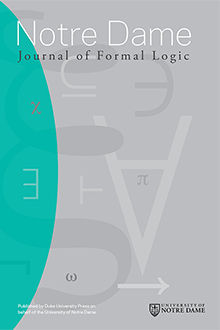Abstract
In recent work MacPherson argues that the standard method of modeling belief logically, as a necessity operator in a modal logic, is doomed to fail. The problem with normal modal logics as logics of belief is that they treat believers as "ideal" in unrealistic ways (i.e., as omnidoxastic); however, similar problems re-emerge for candidate non-normal logics. The authors argue that logics used to model belief in artificial intelligence (AI) are also flawed in this way. But for AI systems, omnidoxasticity is impossible because of their finite nature, and this fact can be exploited to produce operational models of fallible belief. The relevance of this point to various philosophical views about belief is discussed.
Citation
Kieron O'Hara. Han Reichgelt. Nigel Shadbolt. "Avoiding Omnidoxasticity in Logics of Belief: A Reply to MacPherson." Notre Dame J. Formal Logic 36 (3) 475 - 495, Summer 1995. https://doi.org/10.1305/ndjfl/1040149361
Information





